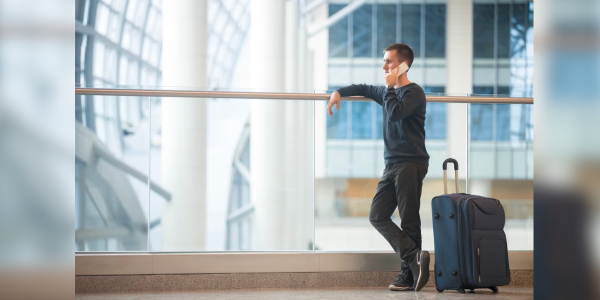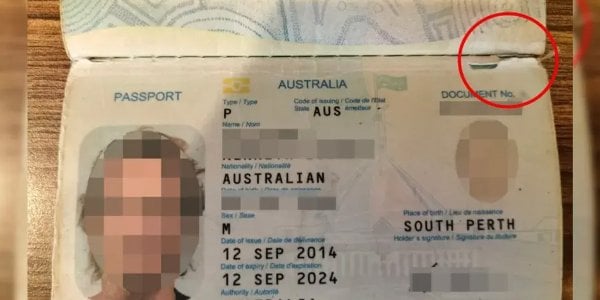Can you believe this? Aussie man denied boarding on flight due to simple detail
By
VanessaC
- Replies 8
Travelling can be a stressful experience for many of us, but imagine how Mike (a pseudonym to protect his identity) felt when Batik Air refused to let him board his flight because of a trivial issue in his passport!
The incident occurred at Perth Airport when Mike tried to fly to Bali with Batik Air. After check-in, staff noticed a small tear near the spine of the passport, visible on the photograph page, which caused his boarding to be 'flat out' rejected.
It didn’t help that Mike had already travelled to Bali with them the previous week. 'I kicked up a bit of a stink, saying it was absolutely ridiculous,' he said.
Fortunately, Mike was savvy enough to know his rights as a passenger. So what did he do? He took matters into his own hands and walked down the terminal to look for another flight. He was lucky enough to find an AirAsia flight that accepted his passport–but this time he had to pay for a $600 ticket!
Members, you wouldn’t want to miss out on your flights, especially when you’ve paid for them already. But how can you be sure you’ll be accepted?
The Australian Government has some important guidelines regarding damage and faulty passports. Tears can lead to them being denied, particularly if they’re on the identification photo page. It’s important to inspect your passport regularly and ensure all pages are intact, as you’ll be the one to foot the bill for a replacement ticket if you’re denied boarding!
The Department of Foreign Affairs and Trade makes it abundantly clear that a passport must be kept in pristine condition to ensure travel goes off without a hitch.
Even slight damage can invalidate a passport. This includes water damage, unwarranted creases, or discolouration. If your passport has endured a trip or two in the washing machine, or a cup of tea spilt on it during that bingo get-together, it's best to get it replaced.
As evident in Mike's case, general wear and tear accumulate over time. A passport's life span is typically ten years, but ensuring it's in top-notch condition throughout that decade is entirely your responsibility.
Don't let the illusion of a seemingly little tear or crease trick you into complacency. If it’s noticeable enough to catch the eye of airline staff or immigration officials, you could find yourself in a similar predicament to Mike.
If you have doubts about your passport, it's better to play it safe and replace it. After all, the cost of a new passport pales in comparison to the price of an unplanned, last-minute flight, let alone the stress and surprise that comes with being denied boarding when you're ready to take off on your holiday.
It may also help to contact relevant airlines regarding their policies on passport damage and the Australian Passport Office for support to save yourself the hassle.
Do you have any tips for members when it comes to travelling? Share them with us in the comments section below, and let us know any stories you have about passport damage or flight rejections.
The incident occurred at Perth Airport when Mike tried to fly to Bali with Batik Air. After check-in, staff noticed a small tear near the spine of the passport, visible on the photograph page, which caused his boarding to be 'flat out' rejected.
It didn’t help that Mike had already travelled to Bali with them the previous week. 'I kicked up a bit of a stink, saying it was absolutely ridiculous,' he said.
Fortunately, Mike was savvy enough to know his rights as a passenger. So what did he do? He took matters into his own hands and walked down the terminal to look for another flight. He was lucky enough to find an AirAsia flight that accepted his passport–but this time he had to pay for a $600 ticket!
Members, you wouldn’t want to miss out on your flights, especially when you’ve paid for them already. But how can you be sure you’ll be accepted?
The Australian Government has some important guidelines regarding damage and faulty passports. Tears can lead to them being denied, particularly if they’re on the identification photo page. It’s important to inspect your passport regularly and ensure all pages are intact, as you’ll be the one to foot the bill for a replacement ticket if you’re denied boarding!
The Department of Foreign Affairs and Trade makes it abundantly clear that a passport must be kept in pristine condition to ensure travel goes off without a hitch.
Even slight damage can invalidate a passport. This includes water damage, unwarranted creases, or discolouration. If your passport has endured a trip or two in the washing machine, or a cup of tea spilt on it during that bingo get-together, it's best to get it replaced.
As evident in Mike's case, general wear and tear accumulate over time. A passport's life span is typically ten years, but ensuring it's in top-notch condition throughout that decade is entirely your responsibility.
Don't let the illusion of a seemingly little tear or crease trick you into complacency. If it’s noticeable enough to catch the eye of airline staff or immigration officials, you could find yourself in a similar predicament to Mike.
If you have doubts about your passport, it's better to play it safe and replace it. After all, the cost of a new passport pales in comparison to the price of an unplanned, last-minute flight, let alone the stress and surprise that comes with being denied boarding when you're ready to take off on your holiday.
It may also help to contact relevant airlines regarding their policies on passport damage and the Australian Passport Office for support to save yourself the hassle.
Do you have any tips for members when it comes to travelling? Share them with us in the comments section below, and let us know any stories you have about passport damage or flight rejections.
Last edited by a moderator:









